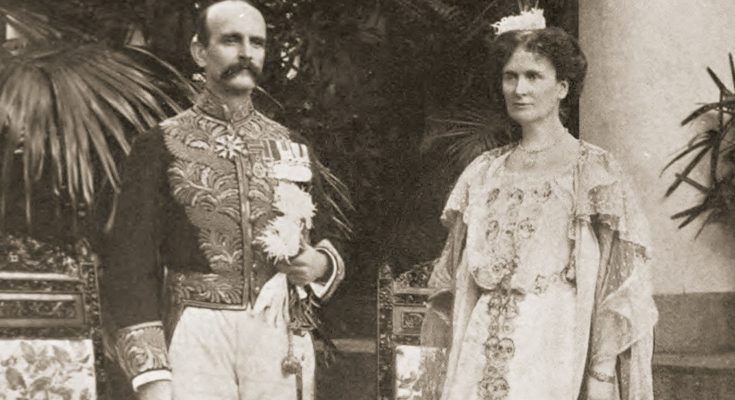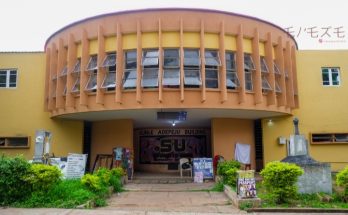By: Olúwábùkúnmi Abraham Awóṣùsì
Perhaps one of the most agitated questions in the past two centuries has been the evolution and birth of Nigeria as a nation. One will hardly survive intellectual exhaustion in a discussion of Nigerian history. The reason for this is multifaceted: while some are conceptualising the autonomy of states, some are suggesting the establishment of the regional government, and others, tilting towards the maintenance of the wobbling common bond theory of Nigeria state.
All these opinions are a result of the 1914 amalgamation, which legally married the Southern Region with the Northern Region in an attempt to create a unified nation of two different groups with different historical backgrounds. It is, however, pertinent to note that this 1914 event was never a standalone event, it is a succeeding event that sufficed wars and conquests conducted by British governments and the Royal Niger Company force under the West Africa Frontier Force (WAFF), land confiscation, missionaries’ expeditions, and different explorations. In essence, all that led to the amalgamation of 1914, are chronological events perpetuated by the British governments in order to subjugate empires and make servants already powerful kingdoms. This series of activities were summarised by E.A. Ayandele in his essay titled External Relations with Europeans in the Nineteenth Century in the Groundwork of Nigeria History edited by Obaro Ikime, as the “three forms” the Europeans came to Africa, “as an explorer, a missionary and a trader – before he finally took over as the overlord.”
In order to properly argued some of the mistakes of 1914, it is essential to briefly look into the historical overview of both the Northern and Southern Regions. Hence, the following questions: what is the major difference between the North and South Region? What are their historical similarities and differences? What necessitated the formation of Nigeria as a nation, and finally, what can be regarded as the mistakes of the amalgamation of 1914?
The Northern Region
The Northern Region is predominantly a composition of the Hausa Kingdoms. However, the Hausa Kingdom itself is a conglomeration of seven states founded according to the Bayajidda legend by the six sons of Bawo and himself, the son of the hero and Magajiya Daurama which are Daura, Kano, Katsina, Zaria (Zazzau/Zegzeg), Gobir, Rano, Hadejia (Biram). In addition to these seven states (Hausa Bakwai) are also the seven illegitimate states according to the Bayajidda legend which are Zamfara, Kebbi, Yauri, Gwari, Kwararafa, and Nupe. However, by the 12th century, Hausa Kingdom, having gained much influence under the Mali empire, had become a formidable empire with trading activities and competing with Karnem-Bornu.
A major event that altered the history of the Northern Region is the Islamic Jihad of 1804 led by Uthman Dan Fodio to return the Hausa Kingdom to the pristine state of Islam. Hence, what this led to is also multifaceted but the most important of them all is the introduction of a theocratic government headed by the commander of the faithful (Amīr al-Muʾminīn.) Therefore, this new system of government creates a centralised and highly spiritual leader with absolute rule over the people’s life.
By the late 19th century, when the European explorers and conquerors had penetrated into the geographical space of what will later be known, the already met theocratic government made it more convenient for them to introduce the indirect rule system of government by the inception of colonial governance. While the geographical definition of this region is densely desert (a big economic disadvantage to the British government economy), the need to balance the scale of their economy resulted in the merging of this region with another—the Southern Region.
The Southern Region
The area known as the southern region in Nigeria before the division of Bernard Henry Bourdillion in 1939 is quite a wide land coverage different from what we have today. It consists of the Yoruba kingdoms, the Benin empire, and the Igbo states entirely. However, owing to these geographical measures, the southern region offers massive economic opportunities to the Royal Niger Company, and by impact, the necessity to make a region (south) depend on another (north) became paramount.
Particularly, the southern region has different histories per the kingdoms it consisted of; however, the often referred to of them all are the Igbo states. The reasons for this are not also far-fetched as it consisted of the major trading passage of the RNC—River Niger which Mungo Park described as ‘infinite pleasures of the great object of his mission.’
The Igbo states, being different from the North in their system of administration—acephalous, it became difficult for the British government to govern them as a whole and this led to the introduction of Warrant Chief System.
Before the final analysis of the central theme of this essay—the mistake of 1914, it is important to briefly look at two important questions: What is Nigeria? Why is it formed? Hence, to answer this, one might have to ask an important question: who christened Nigeria?
The Birth of Nigeria
The History is incomplete without the mentioning of Goldie Tubman purchasing receipts of the empires it covered. However, without dwelling much on the purchasing of these empires, it is essential to redefine who christened Nigeria and where is it.
Perhaps one of the erroneous beliefs alongside Mungo Park being named as the person who discovered River Niger is that Flora Shaw named Nigeria. However what the journalist did was amplify what was already said, and her position, being the wife of the Governor-General gave the suggestion more credence and by impact, an ascription of Nigeria naming priestess. In July 1897, Goldie Tubman sent a memorandum to the Colonial Office in which he referred to ‘the administration of Nigeria’ and by Nigeria, Goldie means the Northern Region.
However, on the verge of the Colonial Government taking over Nigeria as a colony from Goldie’s company, various names were suggested such as Goldiesia (like Rhodesia), Upper and Lower Nigeria, Niger Soudan and Niger Coast, Nigritia, and British Soudan. All these did not suit Joseph Chamberlain, the British Secretary of State for colonies, which made him write to the officials of the Colonial Office following their name suggestion correspondence in 1898 and 1899 that, ‘it must be Nigeria—and not Soudan.’
So, if Goldie suggested the name first, and Chamberlain assigned the name to the Colonial Office at the point of British government occupation, what then did Flora Shaw do?
On 8 January 1897, ‘Nigeria’ was published anonymously in The Times by Flora Shaw where she noted, ‘The name ‘Nigeria’ applying to no other part of Africa, may, without offence to any neighbours, be accepted as co-extensive with the territories over which the Royal Niger Company has extended British influence, and may serve to differentiate them equally from the British colonies of Lagos and the Niger Protectorate on the coast and from the French territories of the Upper Niger.’ Hence, what Flora Shaw did was provide a clearer path for others to follow in using Nigeria as an official name for the country. Notwithstanding, we must also note that in using Nigeria, she only refers to the present-day north-west, north-central, and north-east
Having analysed the naming of Nigeria, it is essential to dive fully into the major discussion of this essay, the mistake of 1914.
Mistakes of 1914
What preceded 1914 as seen above through events traces mere exploration and exploitation, then wars and conquest. On January 1, 1900, at 7:20 am in Lokoja, the Royal Niger Company’s flag was removed and the Union Jack flag was hoisted to replace it; hence, this became the beginning of the British Government. This flag was going to be the central history of these two regions for the next 60 years and above. But January 1, 1900, was not the year of Britain’s formal occupation, cases like Britain’s annexation of Lagos on August 6 1861 emphasised the presence of British influence as Government in the area that will be known as Nigeria.
However, on January 1 1914, after 14 years of deliberation of policy which was the merging of the northern protectorate governed by Britain’s high commissioner, Frederick Lugard and the southern protectorate governed by Ralph Moor into one as suggested by Goldie Tubman earlier actualised.
By impact, what this meant was that two protectorates with different historical backgrounds, cultural differences, different peoples, religions, and climatic conditions were amalgamated into one single nation. What is baffling is that even Tubman realised these differences as he noted, ‘…as widely separated in laws, government, customs, and general ideas about life, both in this world and the next, as England is from China’ and yet still suggested the marriage of the two protectorates.
It should therefore be noted that these differences did not miraculously eradicate after the amalgamation instead they grew and became glaring so much that years after the colonial administration up to the present day, these differences affect the peoples of Nigeria.
The mistake of 1914 cannot be fully discussed without mentioning the North-South dichotomy which still exists today. Prior to the British administration in the North, the Jihad had successfully made the empire an entire Arab-like nation which was dependent solely on Islamic law and culture. Hence, during the colonial governance in Northern Nigeria, the government officials prevented the Christian missionaries from penetrating the North. While this may mean the preservation of the Islamic religion, what it meant was the hindrance of Western education which has already penetrated the hinterland Southern region. Hence, by joining these two regions, there were evident educational disparities between the North and South.
Another mistake of this year happened in 1939 as the division of the southern region into Western and Eastern Region and leaving the Northern Region as it is. What this meant is that, geographically, the northern region is twice the eastern and western regions. By impact, creating a lopsided country with a sickling federation. It is in this light that Awwal Abdullahi Aliyu, NCM president boastfully noted that “Politics is a game of numbers and we have the numbers. We are 120 million in population from the north, then the Fulani have 40 million in population and if you put that together that will give you 160 million out of approximately 210 million population in the country,”
In light of these mistakes, various pioneers and nationalists noted right after colonialism the effect and imbalance of this event. Sir Ahmadu Abubakar noted that, “since 1914, the British Government has been trying to make Nigeria into one country, but the Nigerian people themselves are historically different in backgrounds, in their religious beliefs and customs and do not show themselves any sign of willingness to unite. The fact that we`re all Africans might have misguided the British Government. We here in the North, take it that `Nigerian unity` is not for us.”
Similarly, Chief Obafemi Awolowo pontificated in his book, Path to Nigerian Freedom that “Nigeria is not a nation. It is a mere geographical expression. There are no ‘Nigerians’ in the same sense as there are ‘English’, ‘Welsh’ or ‘French’. The word ‘Nigerian’ is merely a distinctive appellation to distinguish those who live within the boundaries of Nigeria and those who do not.”
Recently, Chief Fred Agbaje, quoted by Femi Akomolafe in his article, Nigeria: Celebrating the mistake of 1914, held that the union is a wasted alliance. According to him, “Whatever was the reason for the amalgamation and the intention, it was the beginning of the problems of Nigeria. It was a criminal amalgamation for selfish economic and political reasons by the British. It put the political administration of Nigeria in the hands of some people instead of creating an equitable distribution of power.”
Also, Richard Akinjide noted, “In fact, the so-called Nigeria created in 1914 was a complete fraud. It was created not in the interest of Nigeria or Nigerians but in the interest of the British. Nigeria was created as a British sphere of interest for business.”
Conclusion
It should be noted that the major reason for the amalgamation was not born out of love or proximity, but the economic advantages. This was noted by Lugard, ‘Northern Nigeria is as yet largely dependent on a grant in aid … I feel myself that economy can only be effected by the realization of Mr Chamberlain’s original scheme of amalgamating Northern and Southern Nigeria and Lagos into one single administration. It is only in this way that Northern Nigeria, which is the hinterland of the other two, can be properly developed, and economies introduced into the triple machinery which at present exists. The country, which is all one and indivisible, can thus be developed on identical lines, with a common trend of policy in all essential matters.’
Hence, the economic advantages gained from the southern province became a major reason for lumping two cultures together and creating geographical and ideological problems for the people. And while we languish in these differences, we should never forget the after-dinner speech of Lord Lewis Harcourt, We have released Northern Nigeria from the leading strings of the (British) Treasury. The promising and well-conducted youth is on an allowance ‘on his own’ and is about to effect an alliance with a Southern lady of means. I have issued the special licence and Sir Frederick will perform the ceremony… May the union be fruitful and the couple constant!
1The Common Bond Theory is one of the two theories of intergroup relationships in Nigeria. This theory suggests unity in diversity.
2Royal Niger Company, Charter and Limited (RNC) were fully granted their trading charter on July 10, 1886. It was a trading company headed by Goldie Tubman, the man who laid the foundation of Britain’s colonial government in Nigeria. He was a tradesman, and through his company, he bought out most of the kingdoms or compel them to enter a legal agreement with him in order for them to secede their land to him and his company for trading.
3This river is also referred to as ‘the great river’, ‘Kwora’, in the Arabs documentation, ‘Bahr Sudan’, while the ancient Greek geographer, Ptolemy, referred to it as ‘Nigir.’
4Flora Shaw




